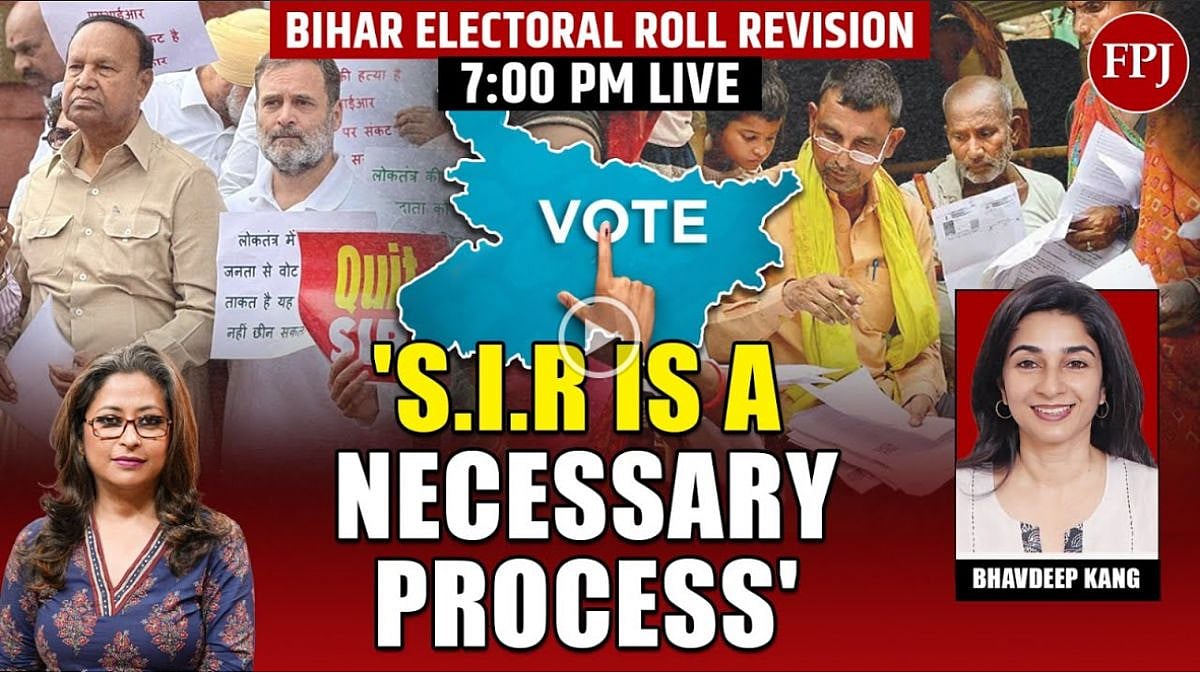As the Special Intensive Revision (SIR) of electoral rolls in Bihar sparks fiery protests and adjournments in Parliament, questions are being raised — is this just a bureaucratic necessity or a covert citizenship test akin to the NRC?
In this detailed conversation, Afrida Rahman Ali, Executive Editor of The Free Press Journal, speaks with senior journalist and columnist Bhavdeep Kang, who argues that while the process may be debatable, the principle behind it is essential for India's democratic integrity.
Q1: Why has the SIR process in Bihar created such a political storm?
Bhavdeep Kang: Because it's being seen as more than just a voter list update. While electoral rolls need to be reviewed to remove ineligible names, the manner in which this process is being executed has raised suspicions. If the process is flawed, the outcomes will also be flawed. People fear disenfranchisement, especially those from marginalised or migrant backgrounds.
Q2: Is this essentially a citizenship verification exercise in the name of electoral roll revision?
Afrida Rahman Ali: The opposition claims that this is a "secret NRC" — a way to verify citizenship under the guise of cleaning voter lists.
Bhavdeep Kang: Look, a non-citizen cannot vote. So yes, determining eligibility to vote inevitably overlaps with citizenship. The Election Commission is mandated to ensure that only eligible citizens cast their votes. So while this is not an NRC in name, it is definitely linked to determining citizenship status.
Q3: But if citizenship is not the EC's domain, isn’t the Commission overstepping by demanding such documents?
Bhavdeep Kang: Technically, yes. But practically, no. Because how else do you prove voter eligibility? The absence of an official NRC makes the process complicated. I personally see no harm in having an NRC—it would simplify such verifications.
Q4: If this is needed, why now? Bihar has already had multiple elections based on the existing rolls.
Afrida: Isn’t the timing questionable?
Bhavdeep Kang: That’s a valid question. But regular updating of rolls is a standard practice. Just like Aadhaar and vaccination drives initially seemed difficult but were later accomplished through digital infrastructure, this too can be done — provided it's fair and transparent.
Q5: Migrant workers are likely to suffer most due to document requirements. Isn’t this unfair?
Bhavdeep Kang: It’s true that sourcing documents is harder for migrants. But the Election Commission must accommodate them — with time extensions, alternative verification methods, and even some financial support if needed. It's not an insurmountable problem.
Q6: Critics argue that the Assam NRC process failed. Isn’t Bihar walking into the same trap?
Bhavdeep Kang: The NRC in Assam had software glitches and transparency issues. But that doesn’t mean the idea was wrong. It means execution was flawed. If we can build UPI and run the largest vaccination drive in the world, surely we can execute this correctly — with the right intent and technology.
Q7: Why does the issue feel ideological and not just administrative?
Afrida: Many fear that minorities are being selectively targeted, even profiled.
Bhavdeep Kang: That mistrust stems from past experiences and communal narratives. It's real and must be addressed. The onus is on the Election Commission to train officials, act without bias, and treat all voters with dignity. Otherwise, the process becomes politically loaded instead of democratically empowering.
Q8: But if Aadhaar or PAN aren’t valid for proving citizenship, how do people establish their identity?
Bhavdeep Kang: True. Aadhaar proves residency, not citizenship. Passports are the closest we have to citizenship proof, but even that’s primarily a travel document. So yes, multiple documents are often needed. That’s why the burden on citizens is heavy — and the EC must ensure it doesn’t become harassment.
Q9: Emotionally, this feels humiliating to many. Is that concern valid?
Afrida Rahman Ali: Wouldn't anyone feel insulted being asked to prove their identity again in their own country?
Bhavdeep Kang: Absolutely. It’s like being questioned by the Income Tax department even if you’re honest — it stings. But it's still part of maintaining a system. That said, the EC must approach this with sensitivity, not suspicion. People should be presumed citizens unless proven otherwise, not the other way around.
Q10: Lastly, is this justifiable? Is it right for the government to push forward with this, given the protests and risks?
Bhavdeep Kang: In principle, yes. A clean voter list is essential. Non-citizens must not vote. It is the government’s duty to ensure electoral integrity. But how it's done is everything. If this becomes an exercise in exclusion rather than verification, it will damage democracy instead of strengthening it.

As Afrida signs off, she reminds us that intent and execution must go hand in hand. If the Bihar SIR is a genuine attempt to clean the electoral process, it deserves a chance — but not without oversight. A transparent and citizen-friendly approach will make the difference between democratic reform and political overreach.
Reported by: Free Press Journal
Interviewed by: Afrida Rahman Ali, Executive Editor
Guest Columnist: Bhavdeep Kang
